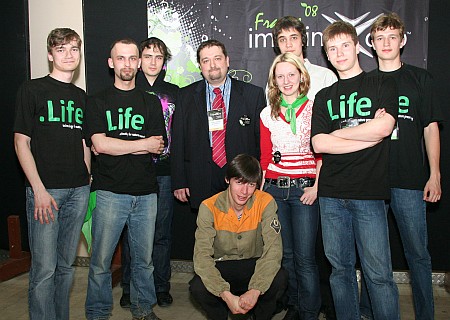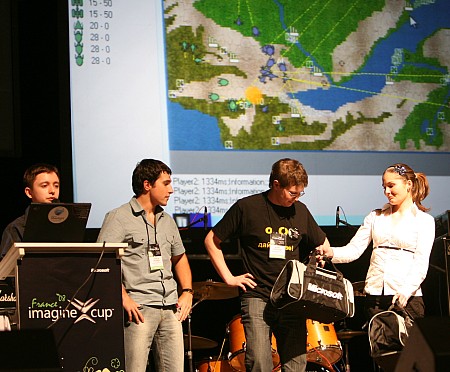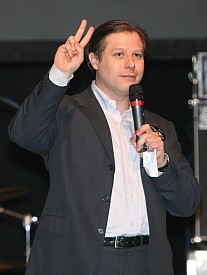Imagine Cup '08: Microsoft seeks talent
The Russian final of the Imagine Cup was held on Friday at the DC of the Moscow Aviation Institute , which for the fifth year has been organized by Microsoft with the support of Intel and many other companies of international and local level. High school students, undergraduate and graduate students have been competing for one year in qualifying rounds in one of several categories, including a competition for software projects and contests for the creation of artificial intelligence and algorithms for solving a specific problem.

Software Designs - The main category of competition. Within its framework, teams create software to implement some of their ideas that fit into the theme of the contest, which changes annually. This year it became the "Environment". In the final, their works were presented by teams from Moscow, St. Petersburg, Nizhny Novgorod, Volgograd, Chelyabinsk and Tomsk. They reached the decisive stage of the competition, having passed through the qualifying stages in the regions that took place in the tenth of March. The first place in the Russian final gives the winning team the right to a Microsoft-paid trip to Paris, where this year's international finals will take place.
Last year, the team from MAI became the winner in the categorywith its Mapedia program. In last year’s cup capital, Seoul, she managed to reach the semifinals. The honor to represent Russia this year fell to the Ignition team from St. Petersburg, uniting three universities (ITMO, St. Petersburg State University, LETI) and the Research Institute of Forestry. Their project, codenamed Arina, is a “decision support system for fighting forest fires.” Names of heroes: Anatoly Nikitin, Roman Belov, Daria Elkina and project leader Yuri Zinovievich Shur.
Simply put, Arina is a program that calculates the best fire extinguishing methods based on terrain features, meteorological conditions, type of forest cover and many other parameters. These parameters are taken into account in the mathematical model developed at the NIIILH based on the methods used abroad and our own experience. The model is refined by experimental data, which a great many have accumulated over the years of observing fires. The system has already been tested in real (almost random) fires and has shown almost complete coincidence of its predicted forecasts with reality. Work on improving it will continue.

The honorable second place was taken by the .Life team from the Nizhny Novgorod State University with a program for calculating polluting factors from human activities. The three-dimensional visualizer allows you to manually drag the "smoking" object (for example, a factory) over the terrain and observe the change in the state diagram of the biosphere in its vicinity.
Third place went to the team of MSTU. Bauman and MIPT ecopatrol with their project for detecting human harmful effects using remotely controlled helicopters.
“Besides the fact that it’s just interesting, the guys from St. Petersburg now have won almost a million rubles - a paid trip to Paris with accommodation in a luxury hotel in the city center,” says Igor Lizunov, a member of the h7 team from Chelyabinsk, who represented our country internationally last year the final of the competition in another category - “ Hoshimi Project ”. The task of the participants of this competition, traditionally, is to save the world. Conventionally, it can be imagined as the creation of artificial intelligence that will control an army of robots in the likeness of a strategic game. On the map of the area, which may be the human body or the vicinity of Lake Baikal, the robots of the two teams are fighting each other, achieving goals and interfering with their achievement by the enemy.
Having passed the qualifying rounds in the regions, the finalists go through the draw and compete in the separate room in the Olympic system, away from the noisy presentation of program projects. The final battle between the h7 team and the Red Devils team from Chelyabinsk took place on the big screen right in front of the audience in the hall. Both teams decided in the first place not to score points, but to interfere with the enemy, but the best result was the Ivanovo team.

At the algorithm competition, they worked on tasks that are difficult to describe, not only to be completed within a few hours in the stressful atmosphere of the competition. The best in the hard business of extreme programming turned out to be Alexander Kuprin from the Oryol Polytechnic, Ivan Naumenko from St. Petersburg State University and Aleksey Boyko from TUSUR (Tomsk), respectively, took second and third places.
 Rogerio Panigassi, coordinator of the international competition Imagine Cup, on the sidelines said that today the cup is gaining the fastest popularity in Eastern Europe, Latin America (Brazil is the second largest community of IC students) and Southeast Asia. This is due to the fact that the competition gives a real opportunity to express oneself, the opportunity to understand what a business wants to see today and what it takes to advance and develop its idea. In Russia, for example, people from the Fund for Assistance to Small Business Development in the STC “catch” the finalists of the competition with their UMNIK program. In the United States and Western Europe, the Imagine Cup is also popular, but there is a slightly different attitude to it.
Rogerio Panigassi, coordinator of the international competition Imagine Cup, on the sidelines said that today the cup is gaining the fastest popularity in Eastern Europe, Latin America (Brazil is the second largest community of IC students) and Southeast Asia. This is due to the fact that the competition gives a real opportunity to express oneself, the opportunity to understand what a business wants to see today and what it takes to advance and develop its idea. In Russia, for example, people from the Fund for Assistance to Small Business Development in the STC “catch” the finalists of the competition with their UMNIK program. In the United States and Western Europe, the Imagine Cup is also popular, but there is a slightly different attitude to it.
When asked about how Microsoft feels that so many talents in developing countries could hardly express itself without the piracy rampant we have, Rogerio answered with a trump card, which was launched in February by Bill Gates himself, DreamSpark . Thanks to it, every student in any country in the world can get MS software for free. I did not miss the opportunity to talk about it with Microsoft International Student Program Coordinator Leandro Doeyo, who is responsible for her at the corporate headquarters.
Leandro said that in the two months since the launch of DreamSpark, the number of downloads of software from the site has reached 450,000. The most popular program was in developed countries: USA, UK, Canada, Germany, France. But this is not due to the fact that in these countries everyone wants to get free software more strongly, but to the fact that in most other countries, it is only starting to establish interaction with educational institutions to verify users of the program as students.
In general, the Imagine Cup competition is actually a fascinating event, which can also bring real benefits to the participants, which are becoming more and more every year.

Software Designs - The main category of competition. Within its framework, teams create software to implement some of their ideas that fit into the theme of the contest, which changes annually. This year it became the "Environment". In the final, their works were presented by teams from Moscow, St. Petersburg, Nizhny Novgorod, Volgograd, Chelyabinsk and Tomsk. They reached the decisive stage of the competition, having passed through the qualifying stages in the regions that took place in the tenth of March. The first place in the Russian final gives the winning team the right to a Microsoft-paid trip to Paris, where this year's international finals will take place.
Last year, the team from MAI became the winner in the categorywith its Mapedia program. In last year’s cup capital, Seoul, she managed to reach the semifinals. The honor to represent Russia this year fell to the Ignition team from St. Petersburg, uniting three universities (ITMO, St. Petersburg State University, LETI) and the Research Institute of Forestry. Their project, codenamed Arina, is a “decision support system for fighting forest fires.” Names of heroes: Anatoly Nikitin, Roman Belov, Daria Elkina and project leader Yuri Zinovievich Shur.
Simply put, Arina is a program that calculates the best fire extinguishing methods based on terrain features, meteorological conditions, type of forest cover and many other parameters. These parameters are taken into account in the mathematical model developed at the NIIILH based on the methods used abroad and our own experience. The model is refined by experimental data, which a great many have accumulated over the years of observing fires. The system has already been tested in real (almost random) fires and has shown almost complete coincidence of its predicted forecasts with reality. Work on improving it will continue.

The honorable second place was taken by the .Life team from the Nizhny Novgorod State University with a program for calculating polluting factors from human activities. The three-dimensional visualizer allows you to manually drag the "smoking" object (for example, a factory) over the terrain and observe the change in the state diagram of the biosphere in its vicinity.
Third place went to the team of MSTU. Bauman and MIPT ecopatrol with their project for detecting human harmful effects using remotely controlled helicopters.
“Besides the fact that it’s just interesting, the guys from St. Petersburg now have won almost a million rubles - a paid trip to Paris with accommodation in a luxury hotel in the city center,” says Igor Lizunov, a member of the h7 team from Chelyabinsk, who represented our country internationally last year the final of the competition in another category - “ Hoshimi Project ”. The task of the participants of this competition, traditionally, is to save the world. Conventionally, it can be imagined as the creation of artificial intelligence that will control an army of robots in the likeness of a strategic game. On the map of the area, which may be the human body or the vicinity of Lake Baikal, the robots of the two teams are fighting each other, achieving goals and interfering with their achievement by the enemy.
Having passed the qualifying rounds in the regions, the finalists go through the draw and compete in the separate room in the Olympic system, away from the noisy presentation of program projects. The final battle between the h7 team and the Red Devils team from Chelyabinsk took place on the big screen right in front of the audience in the hall. Both teams decided in the first place not to score points, but to interfere with the enemy, but the best result was the Ivanovo team.

At the algorithm competition, they worked on tasks that are difficult to describe, not only to be completed within a few hours in the stressful atmosphere of the competition. The best in the hard business of extreme programming turned out to be Alexander Kuprin from the Oryol Polytechnic, Ivan Naumenko from St. Petersburg State University and Aleksey Boyko from TUSUR (Tomsk), respectively, took second and third places.
 Rogerio Panigassi, coordinator of the international competition Imagine Cup, on the sidelines said that today the cup is gaining the fastest popularity in Eastern Europe, Latin America (Brazil is the second largest community of IC students) and Southeast Asia. This is due to the fact that the competition gives a real opportunity to express oneself, the opportunity to understand what a business wants to see today and what it takes to advance and develop its idea. In Russia, for example, people from the Fund for Assistance to Small Business Development in the STC “catch” the finalists of the competition with their UMNIK program. In the United States and Western Europe, the Imagine Cup is also popular, but there is a slightly different attitude to it.
Rogerio Panigassi, coordinator of the international competition Imagine Cup, on the sidelines said that today the cup is gaining the fastest popularity in Eastern Europe, Latin America (Brazil is the second largest community of IC students) and Southeast Asia. This is due to the fact that the competition gives a real opportunity to express oneself, the opportunity to understand what a business wants to see today and what it takes to advance and develop its idea. In Russia, for example, people from the Fund for Assistance to Small Business Development in the STC “catch” the finalists of the competition with their UMNIK program. In the United States and Western Europe, the Imagine Cup is also popular, but there is a slightly different attitude to it.When asked about how Microsoft feels that so many talents in developing countries could hardly express itself without the piracy rampant we have, Rogerio answered with a trump card, which was launched in February by Bill Gates himself, DreamSpark . Thanks to it, every student in any country in the world can get MS software for free. I did not miss the opportunity to talk about it with Microsoft International Student Program Coordinator Leandro Doeyo, who is responsible for her at the corporate headquarters.
Leandro said that in the two months since the launch of DreamSpark, the number of downloads of software from the site has reached 450,000. The most popular program was in developed countries: USA, UK, Canada, Germany, France. But this is not due to the fact that in these countries everyone wants to get free software more strongly, but to the fact that in most other countries, it is only starting to establish interaction with educational institutions to verify users of the program as students.
In general, the Imagine Cup competition is actually a fascinating event, which can also bring real benefits to the participants, which are becoming more and more every year.
